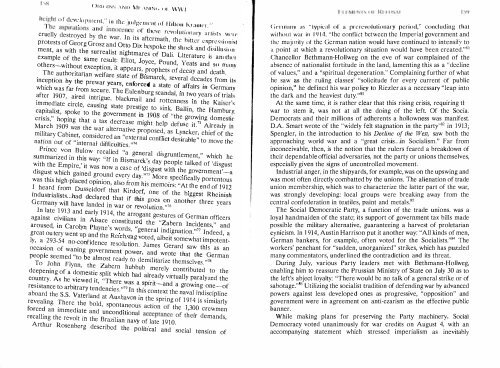CONTENTS - ouroboros ponderosa
CONTENTS - ouroboros ponderosa
CONTENTS - ouroboros ponderosa
Create successful ePaper yourself
Turn your PDF publications into a flip-book with our unique Google optimized e-Paper software.
hei "lli of dewl ) . I .. . .<br />
:' .<br />
.<br />
()[':I( dN\ .' NII Mh\NINf . (II \V\V I<br />
. ' " {II lI1en , .111 (he .!lHlgeflll"1I1 (If Ilillnll I\.,.:IIIH" ::<br />
1 he aS pIr,IlH)fiS and Innoccnc ' f l '<br />
cruelly destroyed by th I<br />
· c () t lese revolulltlllary artisls w,',,'<br />
e war. n its attcrmath th · I "tt<br />
protests of Georg Grosz and Ott D' b..<br />
ment, as with the surrealist ni tmr<br />
example of the same rcsult . Ef . t J<br />
others-without exception i;<br />
, l. 11 n l'xWessi""isl<br />
cspoke the shock and disillusi""<br />
es of Dal!. LIterature is annlhl'1<br />
1 0 , oyce, Pound, Yeats and so m'"IY<br />
The authoritarian welfa: e st P ro P h ts of dccay and death.<br />
e a state of atfalfS in Germany<br />
which was far from secure. Th l<br />
inception by the prewar ycars<br />
.<br />
d"<br />
I marck, several dccadcs from ils<br />
urg scandal, In two years of trial"<br />
aftcr 1907, aired intrigue bl' k '1<br />
p<br />
. g 0 SIOk. BaIlIn, the Hamburg<br />
' ac mal and rottenness 10 the K ' .. "<br />
1m me late clfclc, causing state resti e t ' .<br />
capitalist spoke to th<br />
, e governmen t 10 1908 of "th<br />
crisis," hoping that a tax dec ' h<br />
.<br />
"<br />
alser s<br />
e groWing domeslic<br />
March 1909 was the war alter : se m i g t help defusc it." Already in<br />
military Cabinet consI'dcred an Iv t e pro l<br />
Posed, as Lyncker, chief of the<br />
, . ex erna conllict d . bl "<br />
nation out of "internal difticulf ,,74<br />
P<br />
nncc von Bulow recalled "a general dis runtl "<br />
. ICS.<br />
summarIzed in this way' "If in B' . k'<br />
eSIra e to move the<br />
. g ement, whIch he<br />
with the Empire,' it was ' now a c::a/ day pople talked of 'disgust<br />
disgust which gained ground eve ' d O ,,<br />
was this high-placed opinion al i a \ , More .<br />
;gust With the govcrnment'-a<br />
speclflcally portentous<br />
I heard from Dusseldorf ( hat So K r m f IS memOirs: "At the end of 1 91 2<br />
industrialists ... had declared that i l ; t ;<br />
Germany will have landed in war or revoln'6<br />
In late 1913 and early 1914 the arr<br />
one of the biggest Rhcinish<br />
another three years<br />
against civilians in Alsace onstitu o an ge , tures of Geman officers<br />
aroused in Carol PI"<br />
grcat o;tcry went an: k WO d <br />
Iy, a 293-54 no-confidence re:l:i v t .<br />
occasion of waning governme t<br />
people seemcd "to b I<br />
To J h FI<br />
t, t e Zabern InCidents," and<br />
, general indignation."" Indeed, a<br />
ed, Ibelt omewhat impotent<br />
. ames Gerard saw thIS as an<br />
n power, and wrote that the German<br />
e a most rcady to demilitarize themselves , , "<br />
o n ynn, the Zabcrn huhbub I<br />
deepening of a domestic s lit which<br />
country. As he viewed it ETh<br />
.<br />
reSIstance to arbitrary tendenc'e' ,,79 I h'.<br />
mere y contnbuted to the<br />
. ' .<br />
had already VIrtually paralyzed the<br />
, ere was a spmt-and a gro . .<br />
wmg one-of<br />
t IS context the naval mdiscipline<br />
aboard the S.S. Vaterland at uav<br />
revealing. Therc the bold<br />
forced an immediate and ' spon d<br />
recalling the revolt in the Bra '1'<br />
A<br />
10 the spflng of 1914 IS SImilarly<br />
taneous aChon Of<br />
.<br />
the 1,300 crewmen<br />
uncon llional acceptance of th . d<br />
Zl Ian navy of late 1910<br />
rthur Rosenberg described the polI'tI'cal<br />
,<br />
.<br />
elf emands,<br />
and social tension of<br />
.<br />
(;cl"lIIany ;IS "typical of a prerevolutionary period," concluding that<br />
wilhoul war in 1'114, "Ihe conniet "etween the Imperial government and<br />
Ihe majmity of the German nation would have continued to intensity to<br />
a point at which a revolutionary situation would have been created,""'<br />
Chancellor Bethmann-Hollweg on the eve of war complained of the<br />
absence of nationalist fortitude in the land, lamenting this as a "decline<br />
of values," and a "spiritual degeneration," Complaining further of what<br />
he saw as the ruling classes' "solicitude for every current of public<br />
opinion," he defined his war policy to Riezler as a necessary "leap into<br />
the dark and the heaviest duty.""<br />
At the same time, it is rather clear that this rising crisis, requiring tI<br />
war to stem it, was not at all the doing of the left. Of the Socia.<br />
Democrats and their millions of adherents a hollowness was manifest.<br />
D.A. Smart wrote of the "widely felt stagnation in the party"" in 1913;<br />
Spengler, in the introduction to his Decline of the West, saw both the<br />
approaching world war and a "great crisis .. .in Socialism." Far from<br />
inconceivable, then, is the notion that the rulers fearcd a breakdown of<br />
their dependable official adversaries, not the party or unions themselves,<br />
especially given the signs of uncontrolled movement.<br />
Industrial anger, in the shipyards, for example, was on the upswing and<br />
was most often directly combatted by the unions. The alienation of trade<br />
union membership, which was to characterize the latter part of the war,<br />
was strongly developing: local groups were breaking away from the<br />
central confederation in textilcs, paint and metals"<br />
The Social Democratic Party, a function of thc trade unions, was a<br />
loyal handmaiden of the state; its support of government tax bills made<br />
possible the military alternative, guaranteeing a harvcst of proletarian<br />
cynicism. In 1 914, Austin Harrison put it another way: "All kinds of men,<br />
German bankers, for example, often voted for the Socialists."" The<br />
workers' penchant for "sudden, unorganized" strikes, which has puzzled<br />
many commentators, underlined the contradiction and its threat.<br />
During July, various Party leaders met with Bethmann-Hollweg,<br />
enabling him to reassure the Pruss ian Ministry of State on July 30 as to<br />
the left's abject loyalty: "There would be no talk of a general strike or of<br />
sabotage."" Utilizing the socialist tradition of defending war by advanced<br />
powers against less developed ones as progressive, "opposition" and<br />
government were in agreement on anti-czarism as the effective puhlic<br />
banner.<br />
While making plans for preserving the Party machinery, Social<br />
Democracy voted unanimously for war credits on August 4, with an<br />
accompanying statement which stressed imperialism as inevitably






